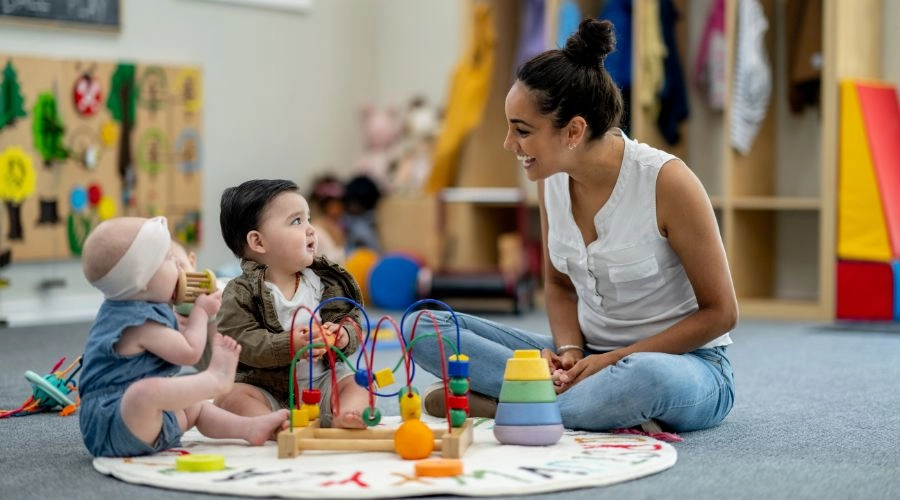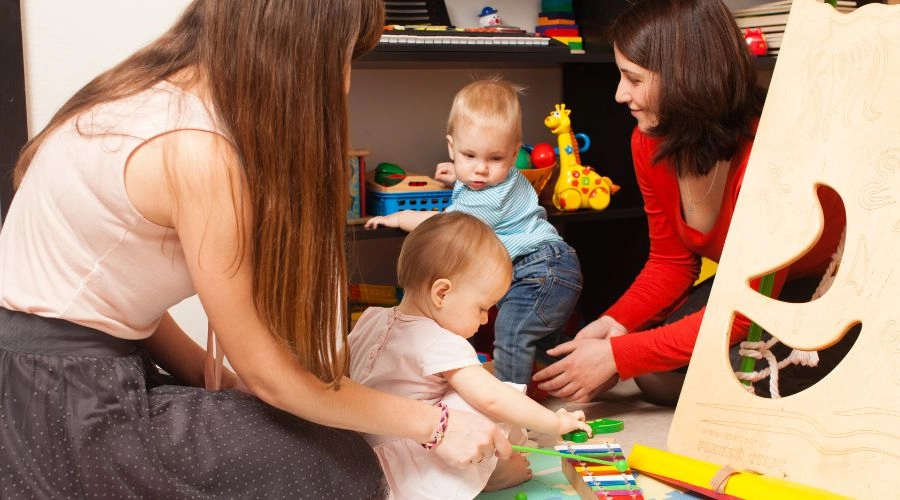Music enrichment programs play a vital role in shaping a child’s growth in the colourful tapestry of childhood development. From the rhythmic sway of dance to the joyful guitar strum, these programs offer benefits that touch every part of a child’s development. Let’s dive into why music is vital in early childhood and how it enhances a child’s growth.
Paramus Daycare is excited to announce the launch of our Music Enrichment Program, a fantastic addition to our academic curriculum. This program offers our students the unique opportunity to develop their creativity, reading skills, math skills, social skills, and confidence through the exploration of musical instruments and learning a wide variety of songs.
The Magic of Music in Early Childhood Development
Music isn’t just background noise in a child’s life; it’s a powerful force influencing their development in remarkable ways. Music and movement activities engage multiple senses and brain regions, creating a rich learning environment that supports overall growth.
Enhancing Cognitive, Emotional, and Social Skills Through Music
1. Cognitive Development:
- Memory and Learning : Music helps make learning memorable. Think of how children recall nursery rhymes and songs—those catchy tunes and repetitive lyrics make information stick. Music activities strengthen memory by linking melodies with words and actions.
- Attention and Executive Functions: Participating in musical activities demands focus, which translates into improved attention span. Following a rhythm or rhythm in music also enhances skills like planning and organization, which are crucial for academic success.
- Mathematical and Spatial Reasoning: Music teaches kids to recognize patterns and sequences, laying a foundation for mathematical thinking. Understanding rhythms and beats involves pattern recognition and spatial awareness, skills that benefit many areas of learning.
2. Emotional Growth:
- Emotional Expression and Regulation: Music allows children to express complex feelings. Whether through singing, dancing, or playing an instrument, music helps children understand and manage their emotions, providing a healthy outlet for their feelings.
- Empathy and Understanding: Exposure to various musical genres and lyrics can foster empathy. As children listen to different types of music, they learn to relate to diverse experiences and emotions, enhancing their emotional intelligence.
3. Social Skills:
Cooperation and Teamwork: Music activities often involve group participation, teaching children the value of working together. Whether singing in a choir or playing in a band, these activities promote cooperation, turn-taking, and effective communication.
Conflict Resolution: Working with others in a music setting helps children navigate social interactions and resolve conflicts. They learn to negotiate roles, share instruments, and collaborate, building vital social skills.
10 Benefits of Music and Movement
1. Enhanced Memory and Learning: Music activities, from learning songs to playing instruments, engage memory and learning pathways in the brain, reinforcing information retention and recall.
2. Improved Language Skills: Music enhances language development through songs and rhythmic patterns, boosting vocabulary, pronunciation, and understanding of language structures.
3. Increased Attention Span: Engaging in music and movement activities helps children build focus and attention, skills that are essential for academic and personal success.
4. Boosted Self-Esteem: Mastering a musical skill or performing in front of others can significantly boost a child’s confidence and self-worth.
5. Better Coordination: Music and movement activities improve motor skills, balance, and coordination, whether through dancing to a beat or playing an instrument.
6. Emotional Expression: Music provides a safe space for children to express and understand their emotions, fostering emotional intelligence and regulation.
7. Social Interaction: Group music activities promote positive social behaviour, helping children build friendships and learn essential social skills.
8. Creative Thinking: Music encourages creativity and imaginative play, allowing children to experiment with sounds, rhythms, and melodies.
9. Stress Reduction: Music can be calming, reducing stress and anxiety and promoting relaxation and well-being.
10. Cultural Awareness: Exposure to various musical styles and traditions helps children appreciate and understand different cultures, promoting inclusivity and diversity.
Conclusion
Music enrichment programs offer much more than just fun; they are crucial for a child’s development. By integrating music and movement into a child’s routine, we foster their cognitive, emotional, and social growth meaningfully. The benefits of music extend beyond the classroom, influencing every facet of a child’s life.
Embracing music enrichment is like opening a door to a world of possibilities for children. It’s an investment in their future, enriching their lives with skills and experiences that will stay with them forever. So, if you’re looking to nurture your child’s growth in a joyful and impactful way, consider the transformative power of music. It’s not just a melody—it’s a pathway to a brighter, more harmonious future.






